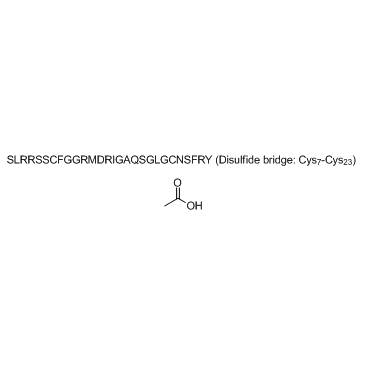Atrial Natriuretic Peptide (ANP) (1-28), human, porcine Acetate
Modify Date: 2024-01-02 15:23:14

Atrial Natriuretic Peptide (ANP) (1-28), human, porcine Acetate structure
|
Common Name | Atrial Natriuretic Peptide (ANP) (1-28), human, porcine Acetate | ||
|---|---|---|---|---|
| CAS Number | 1366000-58-9 | Molecular Weight | 3140.5 | |
| Density | N/A | Boiling Point | N/A | |
| Molecular Formula | C127H203N45O39S3.C2H4O2 | Melting Point | N/A | |
| MSDS | N/A | Flash Point | N/A | |
Use of Atrial Natriuretic Peptide (ANP) (1-28), human, porcine AcetateAtrial Natriuretic Peptide (ANP) (1-28), human, porcine is a 28-amino acid hormone, that is normally produced and secreted by the human heart in response to cardiac injury and mechanical stretch. ANP (1-28) inhibits endothelin-1 secretion in a dose-dependent way. |
| Name | Atrial Natriuretic Peptide (ANP) (1-28), human, porcine Acetate |
|---|
| Description | Atrial Natriuretic Peptide (ANP) (1-28), human, porcine is a 28-amino acid hormone, that is normally produced and secreted by the human heart in response to cardiac injury and mechanical stretch. ANP (1-28) inhibits endothelin-1 secretion in a dose-dependent way. |
|---|---|
| Related Catalog | |
| Target |
Endothelin-1[1] |
| In Vitro | Atrial natriuretic peptide (ANP) is a diuretic, natriuretic, and vasodilatory peptide hormone originally isolated from mammalian hearts. In cultured porcine endothelial cells the inhibition by porcine ANP (1-28) of immunoreactive endothelin-1 secretion after stimulation with Angiotensin II (Ang II) is paralleled by an increase in the cellular cGMP level. Porcine ANP (1-28) strongly inhibits immunoreactive endothelin-1 secretion in porcine aorta after stimulation with Ang II[1]. ANP is a cardiac hormone involved in electrolyte and fluid homeostasis. The inhibition by ANP of endothelin-1 secretion stimulated by angiotensin II (ANGII) and thrombin using cultured human umbilical-vein endothelial cells. Human ANP (1-28) inhibits immunoreactive (ir)-endothelin-1 secretion and increases cyclic GMP in the human umbilical-vein endothelial cells[2]. In glomeruli from normal rats, Human 125I-ANP (1-28) binds to a single population of high affinity receptors with a mean equilibrium dissociation constant of 0.46 nM. Human ANP (1-28) binds to the glomerular ANP receptor with high affinity stimulated cGMP accumulation. Human ANP (1-28) markedly stimulates cGMP generation, but not cAMP generation in normal rat glomeruli[3]. |
| References |
| Molecular Formula | C127H203N45O39S3.C2H4O2 |
|---|---|
| Molecular Weight | 3140.5 |

